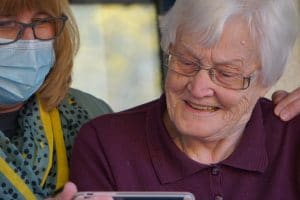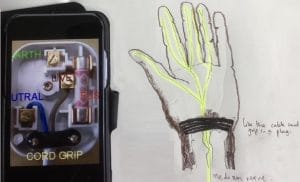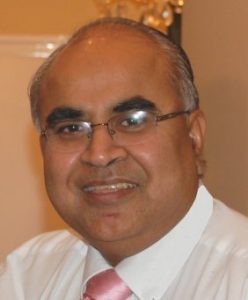Avoidant restrictive food intake disorder (ARFID) is classified as an eating disorder diagnosis. Clare Ellison and colleagues outline the potential signs of ARFID, detail an initial primary care assessment, and present resources for signposting and further CPD.
"I ask them - but I'm not asking them in a way that invites a 'yes'" - It can be difficult to broach the subject of self-harm or suicidal thoughts during a consultation. After altering her practice since reading Ford et al's
With the incidence rate of coeliac disease in the UK increasing four-fold between 1990 and 2011, it is essential that patients with coeliac disease continue to receive appropriate support and management during the COVID-19 pandemic. Here, Yvonne Jeanes et al. outline how
With COVID-19 forcing a shift to predominantly remote consulting, how do we ensure that physician associates are fully supported in their role in primary care? The Sheffield Physician Associate (PA) Preceptorship scheme may be one way, offering a formalised support package for
Half of patients with elevated blood sugars, with an HbA1c greater than 42, are not clinically obese. As well as the usual measures Sarah Blake asks whether we need to pay more attention to post prandial blood sugar spikes - is it
People living with severe and prolonged mental illness in England die 15-20 years earlier than the general population. Richard Armitage alerts us to the fact that there has been a marked decrease in the proportion of such patients who have had a
How should antipsychotic medication be reviewed when patients no longer have access to a psychiatrist? In the UK, little guidance is available. Lisa Grünwald and her colleagues are reflecting on the issues and asking for our help.
Chronic primary pain is a relatively new concept. Ensuring its definition is consistent within new guidelines is key. Here, members of the National Advisory Committee for Chronic Pain provide a number of observations on the use of drugs in chronic pain management,
Safety netting is essentrial in primary care but there is no one accepted definition. Peter Lindsay fixes this for us!
We know that cycling makes for a healthier commute for all, but GPs need evidence to help them allay patient's concerns if we are to incorporate active travel into our standard health promotion toolkit. Bethan Jones gives us the evidence.
30 years ago we were told we were not treating pain adequately. There was a push to give people more analgesia. So, armed with our opioids and gabapentinoids we went and we medicated. But peoples' pain got worse. Katie Barnett examines what
It has been well reported that those in the community and end-of-life care have been hardest hit by the COVID-19 pandemic, but little attention has been given to GPs and district nurses working in end-of-life care and the positive stories they have
Doctors are not strangers to adversity, both in the lives of our patients and sometimes in our own. Judith Dawson examins two inspirational accounts to tell us how we can practically help.
Holly Quinton describes the use of metaphor and drawing in consultations to improve understanding, compliance and rapport. This can help the GP to explain medical terms to a patient, but it can also help the doctor to understand the patient's experience.
Hypersensitivity pneumonitis is a form of interstitial lung disease caused by the repeated exposure and immune sensitisation to organic dusts and certain industrial agents. The circumstances of lockdown may increase the exposure of the public — and waste management workers in particular
Contextual safeguarding is a relatively new concept, which is primarily intended for adolescents. Recognising that young people are often exploited and abused outside their family environment, contextual safeguarding focuses on influencing and shaping those areas.
Rosie Marshall is a GP based in Wiltshire. General practice routinely involves supporting patients presenting with diverse manifestations of stress. This can be a challenging issue for clinicians to manage because by definition there are underlying circumstances (sometimes related to complex and
Ahmeda Ali is a GP in Ireland. Ahmeda’s essay was one of the Sheppard Memorial Prize winners at the Republic of Ireland Faculty Winter Meeting. An abridged version will be published in the BJGP and here we present the full essay with
Pain, Opioids and Syringe Drivers: A Practical Guide for the GP in the Wake of Gosport This article is written by Daniel Knights, Felicity Knights and Stephen Barclay and is published as a companion piece to their editorial in the October 2018 issue of the BJGP. The
Shona Lucitt (right) is currently studying for a Masters in Public Health at Imperial College London. She previously worked at the Alzheimer’s Society supporting a pilot project for people living with YOD. More recently she has been working for Public Health England in
The NHS enters its 70th year with the general practice workforce in crisis. Paramedics already have a track record in providing flexible and innovative ways of delivering extended clinical care.
Peter Lucassen has been working as a GP for 35 years in a small village in the Netherlands and has just retired. He is still working as a senior researcher at Radboud University Nijmegen Medical Centre. He is interested in medically unexplained
Claire Wastakaran is an ST2 trainee in South Yorkshire. “A 5cm lump in the pancreas. Never mind, I will fight it”. These were the words spoken by my father that made me rethink my relationship with him and all my medical training
Nethmi Vithanage is a University of Edinburgh graduate from New Zealand, currently working as a FY2 in general practice and looking to get into a life of public health. Black Wednesday had arrived and along with it, a familiar feeling; like I
Kate Dawson is a full-time remote and rural GP on the Isle of Benbecula in the Outer Hebrides. At our staff night out, I slipped on a wet dance-floor, and in a moment, fell and became a patient. I couldn’t put any weight on my
John Porter recently completed his GP training and is enjoying living in Bath and working as a salaried GP in Bristol. There are items of equipment without which a GP in clinic cannot function. Top of this list comes a stethoscope. Closely
Carrie Ladd is a part time NHS GP, a spare time RCGP Clinical Fellow in Perinatal Mental Health and a full time mum… doing overtime! You can find her on Twitter @LaddCar and she has a website. On Sunday 28th November, Dr Lucy
When a patient says ‘you’re the doctor’ it can mean several things. Sometimes it means ‘I trust you and the advice you’ve given me’, sometimes it means ‘I don’t like what you’re saying but I don’t feel like I’m in a position
George Ampat is a consultant orthopaedic surgeon hoping to help patients find non-surgical solutions. Why have an operation if you can avoid one? It’s a simple question with an obvious answer but increasingly surgery is being used where it may not be
Perhaps I have had a run of bad experiences but I sometimes feel that our secondary care colleagues are beginning to act as technicians and not physicians, directing themselves to a particular task to rule in or rule out a particular diagnosis,
The next GP Journal Club will be discussing the BMJ paper: Migraine and risk of cardiovascular disease in women: prospective cohort study by Kurth et al. You can download it here. Migraine occurs in 15% of the UK adult population and is three times
A great deal of medicine is education. The title ‘doctor’ is derived from the Latin word for teacher. Before getting that title, I spent three years working as a TEFL (Teaching English as a Foreign Language) teacher: first in Spain, and then
The glass bounced off my back and smashed into the drinks gantry shattering a whisky bottle. All I remember is the glass, the blood and that terrible screaming. Glass fights are dangerous, especially as barman, and for $1.80 an hour I often
[starbox id=adamstaten] Today I am writing from the most middle class circle of hell; the circle of hell where sinners are stuck in a perpetual home buying chain. Of all the costly obstacles to selling and buying houses, I have found the
Diagnosis is one of the most rewarding aspects of medicine and is one of the most attractive features of general practice. There are few areas of medicine, arguably just general practice and the Emergency Department, where you get the opportunity to encounter
Bronwen Warner is an FY1 doctor at Oxford University Hospitals NHS Foundation Trust. She spent a month with Heilendi GP Practice in the Orkney Islands as part of her elective at Bristol Medical School. Patients stumble into the waiting room, propelled by a passing
The English Health Secretary, Jeremy Hunt, recently sparked anger when he suggested that parents could look online to determine the severity of their child’s rash. The medical community rightly rebuffed this firmly, highlighting the potential harm that could be caused, notably through
Ahmed Rashid is an academic clinical fellow in general practice at the University of Cambridge. He writes the regular monthly column “Yonder” in the BJGP: a diverse selection of primary care relevant research stories from beyond the mainstream biomedical literature. Twitter: @Dr_A_Rashid
Christos Mousoulis is a medical doctor specialising in Public Health. He is currently an Academic Clinical Fellow doing his health protection placement at Public Health England – West Midlands East team. His main interest is in Academic Public Health and in Clinical Trials
Jonny Coates is one of the First5 GPs that’s not in Australia. He works in Newcastle upon Tyne. Hospitals are awash with Pharma freebies. CCU is littered with the logo of the latest statin, the psychiatrist’s pen bears the name of the
Paper: Douglas IJ, Bhaskaran K, Batterham RL, Smeeth L. Bariatric Surgery in the United Kingdom: A Cohort Study of Weight Loss and Clinical Outcomes in Routine Clinical Care. PLoS Med. 2015 Dec 22;12(12):e1001925. Link: http://journals.plos.org/plosmedicine/article?id=10.1371/journal.pmed.1001925 Ahmed Rashid is an academic clinical fellow

































